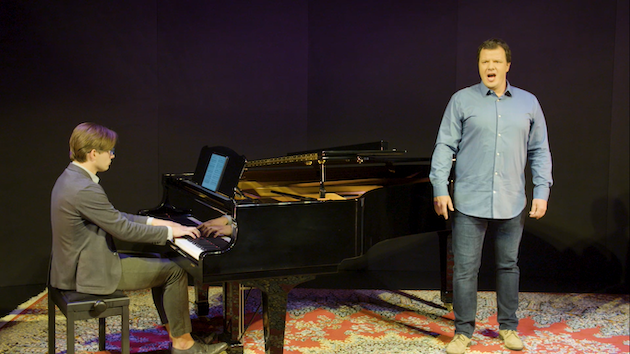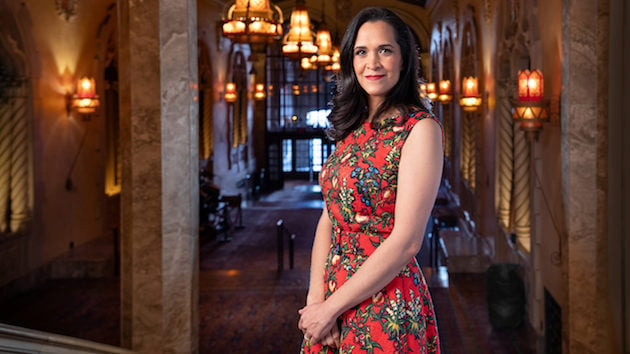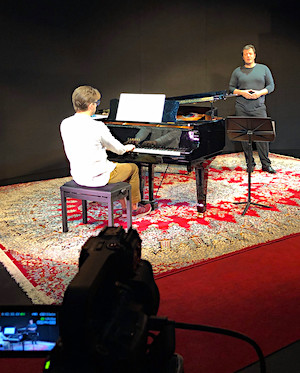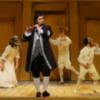
In the midst of figuring out the ins and outs of hosting online content and a live online recital of Schumann’s Dichterliebe (A poet’s love) featuring baritone Eugene Brancoveanu, San José Opera General Director Khori Dastoor had a realization.
“I’m not sure I even realized the demographics of the city of San José, but English is spoken at home in fewer than 50 percent of the households. And it dawned on me that if our programming is only available in the original language onstage with the English supertitles in the opera house, we’ve cut our customer base in half. Just by not being able to welcome people who don’t speak English to our programming. So already we were intending and are intending to inaugurate multiple language supertitles in the theater and then, in the rush to figure out this recital, it dawned on me that ‘Oh my gosh, we don’t have that problem!’ And it became exciting for us to imagine how we could bring Opera San José’s offerings to more of the residents of the South Bay, and San José in particular.”
When you buy tickets to the Dichterliebe recital, which streams through August 15, you’ll have a choice between English, Spanish, or Vietnamese subtitles.
Vietnamese is an obvious choice: we [in San José] have the largest Vietnamese community in the world, outside of Vietnam, [with] over 100,000 residents. Asian and Hispanic populations represent over one third of the demographics of the city. So that’s our starting point; it’s not, by any means, our ending point. And since Dichterliebe is such a repertoire mainstay, I assumed there would be translations of it available in almost every language under the sun. But that was not the case: we found three Spanish translations and then engaged native speakers who were voice professors and performers to evaluate them to select the one that we felt had the most poetic integrity.
But in the Vietnamese search, we found that there wasn’t really any translation of the Heine text that we could find. So we commissioned one from a cultural institute based in Hanoi, whose mission is to expand access of classical music to Vietnamese-speaking people. And they did it for free, just because this is part of their mission.
And so being in Silicon Valley, using the internet to share information to innovate and to make positive change seemed to me to be exactly what we should be thinking about doing. We’re hoping that this new mini-step will create a sense of belonging for non-English speakers at Opera San José and begin a new relationship with different groups in our communities.”

The recital, and others soon to come, takes place in the Fred Heiman Digital Media Studio, created with a leading grant by Opera San José trustee Peggy Heiman, in honor of her husband, Fred. Reflecting on the online content that Opera San José and other classical arts organizations are deploying now, in the face of the pandemic-caused shutdown, and how that might be continued after the shutdown lifts, Dastoor said, “I have become accustomed to making a decision about what we’re going to do and then going out and doing it. If I’ve learned anything in the past few months, it’s that I’m not driving this train.
“There are things happening that I don’t understand yet, the organization will be changed in ways that none of us can anticipate, and so I’ve given up on trying to figure out what the result of all this will be. But I can say that, having had a moment to pause and reflect, the idea that you would have an organization in business 365 days a year that then produces 24 nights of programming is no longer a ratio that makes sense to me. So as I think about how we allocate our dollars and how we grow our service to the community, which is really our mandate, it’s impossible to ignore the possibility for growth in the digital platform.
“And because there had been barriers around cost and technical know-how, how you share licensing fees and royalties — our industry kind of held back and in a way, [the Metropolitan Opera] leadership discouraged smaller companies from even dipping their toes into the waters. So we neglected that for long enough. We are no longer going to pretend that the world isn’t vibrant online and that people don’t consume art online. And Opera San José will not go back to a reality where digital offerings are no longer a part of what we do. I’m investing in it with the seriousness [born of] assuming that it will be with us forevermore.”
Dastoor thinks that the combination of live and online programming can work “hand in hand.” She explains, “When I talk to patrons, so many people became subscribers after they heard a lecture or attended a history course or read a book or listened to a podcast. The possibility for creating digital content that then enriches the experience in the opera house is limitless.”
Running with that thought, Dastoor goes on to envisage being able to present new operatic works more often, especially smaller premieres beyond the stage of the California Theatre, OSJ’s home base:
“There are certain works that are so well suited to our resident company members that would not work in a big theater. I’ve mentioned a few, and I think every producer in the world has been discovering all the chamber works available with two and three characters, and some of it is just incredibly beautiful. And also, does it make sense for world premieres to happen once in a decade [at OSJ] because it’s such an expense and such a throw of the dice? If you have a nimbler working lab to be an incubator for new work, then that’s very healthy.

“This is certainly not a departure from our presence in the California, which, I can’t tell you how much I miss being in that room, and that is certainly our source of pride and identity. But this crisis is pushing us to learn how to do something else … and for the first time in its history, Opera San José can court a worldwide audience. We don’t have to be restricted to people who are willing to come to our venue.”
For that very reason, Dastoor says, “it was important, to me, to monetize this very first recital. There’s so much free content out there now, with the idea of appeasing our donors and patrons and keeping them engaged until this is over. But what if things are just moving forward in a different direction and there isn’t this magic moment when we all feel that this is ‘over’? Then we’ve put everything we’ve ever done in the last 20 years online for free and how is that sustainable? And so learning about how patrons will value this kind of programming and educating them that there is a cost associated with it, is part of the endeavor from the beginning.”
Dastoor’s largeness of vision seems tailor-made for a year in which we’ve all had to pause and take stock of what we’re doing and how we’re doing it. That’s not to say that the pandemic has been in any way good, but, as has often been said, in every crisis there is an opportunity.




